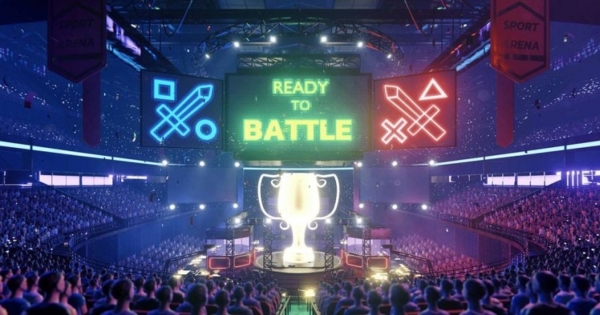Players from eight countries wear wireless headphones and sweat-proof finger sleeves as they control armed armed avatars in virtual battle under the eyes of an enthusiastic audience watching the action on a big screen in Riyadh.
This competitive tour is part of Gamers8, a summer festival that highlights Saudi Arabia’s rise as a major player in electronic gaming globally, with officials looking to compete with giants in the sector such as China and South Korea.
As with Formula 1 and professional golf tournaments, Saudi Arabia, the world’s largest exporter of crude oil, has capitalized on its vast wealth in recent years to establish its position in the esports sector.
The moves drew criticism that Saudi Arabian officials were anticipating, as some esports leaders objected to human rights abuses in Riyadh.
But the lack of long-term funding for esports makes the sector particularly interested in dealing with the Saudis, which explains why the response has been relatively muted so far, analysts say.
Saudi players are enjoying the new prestige of their country and the great prizes they can win.
“There was no support in the past,” said Faisal Al-Ghafiri, 22, who competed in the $3 million Battle Royale tournament.
“Thank God, now is the best time for me to play esports and compete in tournaments,” he added, noting that what was once a hobby has turned into a lucrative “job.”
-management support-
Saudi Arabia’s interest in gaming and the e-sports sector comes from the top of the ladder of power as Crown Prince Mohammed bin Salman is known to be a passionate Call of Duty player.
The Saudi Arabia Esports Federation was established in 2017 and since then the number of esports teams in the Kingdom has grown from two to over 100 teams.
The survey showed that 21 million people, almost two-thirds of the entire population, identify themselves as gamers.
And in January last year, the State Investment Fund, led by the crown prince and de facto ruler of the kingdom, launched the electronic gaming company Savvy Group, which acquired ESL and FACIIT in two deals for about $1.5 billion. .
Last week, the Crown Prince launched the National Esports Strategy, which aims to create over 39,000 direct and indirect jobs by 2030, with over 30 games produced in local studios.
Next year, Riyadh will host the Global Esports Games, which has been described as the “highlight” of the global competitive esports sector.
“I think it’s amazing that the[Saudi]government has brought esports to the forefront when many countries are still trying to find it,” said British Esports CEO Chester King.
“I can say that Saudi investment is probably the highest in the world,” he added.
-Bleaching Claims-
The games are also expected to be a major component of Saudi Arabia’s massive development projects, such as the futuristic city of NEOM on the Red Sea coast with the construction of two parallel mirrored skyscrapers over 170 kilometers long, known as “The Line”.
However, NEOM is also where Saudi Arabia has faced its biggest setback in esports.
Two years ago, the American company Riot Games announced a partnership that would make NEOM the sponsor of the League of Legends European Championship.
The announcement at the time sparked an immediate and massive outcry led by LGBTQ players who denounced Saudi Arabia’s ban on homosexuality, an act that could constitute a capital crime in the conservative kingdom.
League of Legends is gay and transgender friendly, and gay hip-hop star Lil Nas X received the honorary title of “chairman” last week.
Within 24 hours of NEOM’s announcement, Riot Games backed off, with Danish tournament organizer BLAST terminating its own deal with the metropolis nearly two weeks later.
“The reputation of Saudi Arabia will always be a barrier to the esports community, despite efforts to improve it,” said Jason Delister of the University of Lille in France, who studies the geopolitical aspects of esports.
-money speaks-
However, these concerns have not discouraged Saudi Arabian officials who continue to support the esports world.
“Games have always been more morally flexible because they are often project based and don’t have a sustainable business model,” said Tobias Schultz, an esports expert at the University of Siegen in Germany. “Esports needs money compared to golf or anything else,” he added.
In turn, the president of the International Esports Federation, Vlad Marinescu, dismissed any suggestion that the kingdom is using esports to try to whitewash its reputation.
“Bleach is a word that must be preceded by something dirty,” Marinescu told AFP. “Saudi culture is beautiful and rich.”
The head of the Saudi Arabian Electronic Sports Federation, Prince Faisal bin Bandar bin Sultan, told AFP that his vision is for the kingdom to become the natural choice for esports fans.
He added, “One of the things that surprised me the most during our last Gamers 8 event was the number of young players from Saudi Arabia who came up to me and said, ‘We always liked to watch these things, but we never we didn’t think we would.” d get them here.”
“These are feelings and this is the image that I want to keep,” he added.
Source: El Iktisad
